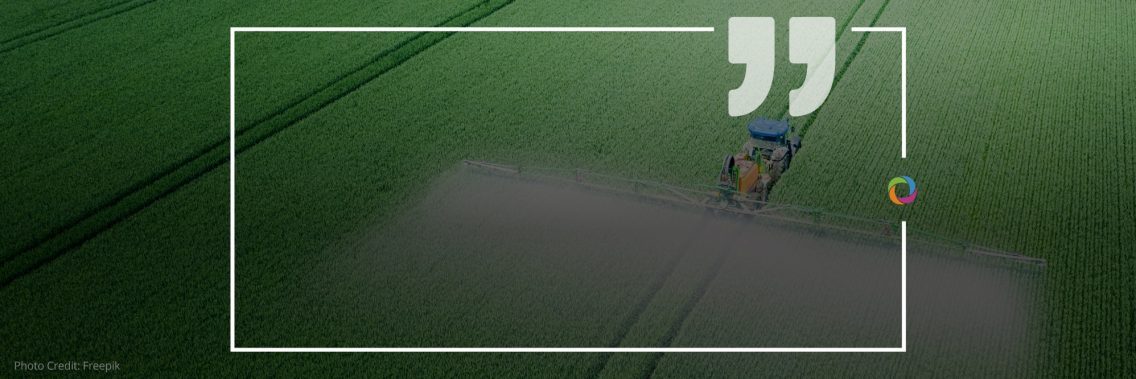As Russia faces severe economic sanctions imposed by Western and Asian developed economies as a result of its invasion of Ukraine, experts warn of the potential fallout for the worldwide agriculture sector. Fertilizer prices continue to surge to record levels as the ongoing war places a massive share of the world fertilizer supply at risk. Statistics show that Russia and its ally Belarus, which is not involved in the military action but is also subject to certain sanctions, represent about 35% of global potash supply and 40% of production capacity. We discussed the impact of the fertilizer crisis with several experts in agriculture. Check out their insights below.
Key takeaways
-
-
-
-
-
- The world is currently witnessing the beginning of a global food crisis, driven by the knock-on effects of the corona pandemic and more recently the rise in fuel prices and the conflict in Ukraine.
- Russia’s exports account for 18% of the world’s potash market, 20% of ammonia sales, and 15% of urea. Furthermore, a lot of the natural gas that is the most expensive part of manufacturing nitrogen fertilizers comes from Russia.
- Ukraine supplies significant quantities of cereals and oil crops to global markets, including 12% of the world’s wheat, and it is the largest global supplier of sunflower oil.
- The lack of chemical fertilizers can reduce crop yields by as much as 50%, experts suggest, bringing an associated rise in food shortages and higher food prices.
- Experts state that ways to mitigate the global food crisis could include support from the international community for an increase in crop breeding programs.
-
-
-
-
What are the greatest consequences of the upcoming fertilizer shortage?

“Russia and Ukraine are some of the largest producers of agricultural and food products worldwide. Ukraine supplies significant quantities of cereals and oil crops to global markets, including 12% of the world’s wheat and it is the largest global supplier of sunflower oil. Egypt, Turkey, and Bangladesh are at particular risk from reductions in Ukrainian and Russian grain supplies. The interruption of crop sowing in Ukraine and a lack of fertilizer for the crops already planted will affect this year’s harvest and lead to higher global food prices. Additionally, Russia and Belarus are major suppliers of potash and phosphate which together with nitrogen constitute the major ingredients in the chemical fertilizers that are required to produce the crops that feed the world’s population. A lack of chemical fertilizers can reduce crop yields by as much as 50% bringing an associated rise in food shortages and higher food prices. Developing countries will be hit hardest by the shortages of both food and fertilizers leading to food insecurity in poorer countries and a global food crisis. My first-hand knowledge of this was experienced last year before the current crisis while working in Sri Lanka where in 2021 the government banned the import of chemical fertilizers, pesticides, and fungicides; farmers told me that as a result, their rice crop yields had halved. The government reversed the decision after huge national protests but too late for the rice crop.”

“Ukraine is considered the breadbasket of Europe, supplying grains for the production of balanced feed for livestock and for the production of bread and other related commodities. On the other hand, fertilizers are needed for higher yields of crops and therefore a shortage will affect food production. The consequences of this will definitely have a negative impact on prices, causing an increase. Production costs will increase and hence food commodity prices as well, affecting the purchasing capacity of those with less income. On the other hand, a shortage of fertilizers may create the necessity of using more sustainable and environmentally friendly agricultural approaches, using other kinds of fertilizing practices such as green manure, compost, and others thus reducing the dependency on external inputs.”

“The greatest consequence of the current crop and fertilizer shortages caused by Russia’s invasion of Ukraine will be increased food prices in the developing world. With Russia, Ukraine, and Belarus being some of the largest fertilizer exporters, the uncertainty around their market access is already raising fertilizer prices all over the globe. This is because almost half of the global fertilizer demand is driven by three crops, of which corn represents about 16% of the farm-use fertilizer demand, wheat represents about 15% of fertilizer demand and rice represents 14% of fertilizer demand. These are staple crops for the vast majority of bottom-of-the-pyramid subsistence farmers who will now be constrained more than ever in their access to fertilizer which is an important ingredient for successful farming. An additional factor in the rising prices that are lowering the use of fertilizer by farmers is that of the sharply rising price of natural gas which is an important component in the production of most fertilizers.”
What should the international community do in this regard?

“Ways to mitigate the impending global food crisis, especially in developing countries could include support from the international community for an increase in crop breeding programs to develop higher-yielding crops that are less dependent on the use of chemical fertilisers, which are harmful to biodiversity, and that are more able to cope with increasing global temperatures. Improvement in soil and water management practices to improve soil health could increase crop yields in areas with degraded soils. The introduction of support programs for farmers to establish regenerative agricultural practices could help to improve soil health and the efficiency of nutrient use by crops as well as agroforestry, rainwater harvesting and water conservation systems, and improving food storage. In developed countries, a reduction in food loss and waste and a move towards more seasonal eating habits with a decrease in demand for year-round exotic foods could lower the use of land and water for exported foods in developing countries thus allowing these to be used for local food requirements.

“I think we all agree that the war in Ukraine is unacceptable and it is a bad decision made by Russia as with all the other ongoing wars. The attention is now on Ukraine but we should not forget the suffering of other people in the world as a result of war (Yemen, Ethiopia, Palestine, others). Sanctions are welcome but may also have a negative impact on the world’s economies as could be seen with the oil imports from Russia. The shortage of oil will also have an impact on commodity prices, increasing these and once again reducing the purchasing power of those with a lower income. I referred to oil as the simplest example but there are others as well. I think beside the sanctions, showing solidarity to the Ukrainian people is the right thing to do by allocating resources to assist people in refugee camps, welcoming immigrants and giving them asylum, and donating money to alleviate their situation.”

“In my opinion, the international community should focus its efforts on ensuring that farmers can continue to access fertilizers which ensure increased productivity. This should be done by building the capacity and purchasing power of rural agro-dealers to distribute fertilizer to farmers that need it. Supporting small-scale agro-dealers with interventions to improve their financing capacity (so they can access loans), to engage in bulk purchases of inputs (so they can achieve economies of scale), and to build their retailing skills (so they can put fertilizer in the hands of farmers) are greatly needed. These activities and others to support increased fertilizer use are supported, for example, by CNFA’s Farm Service Center (FSC) model which provides tools to agro-dealers that enable them to reach more farmers with fertilizer.”
Check out more than 140 job opportunities in the Agriculture sector here.

